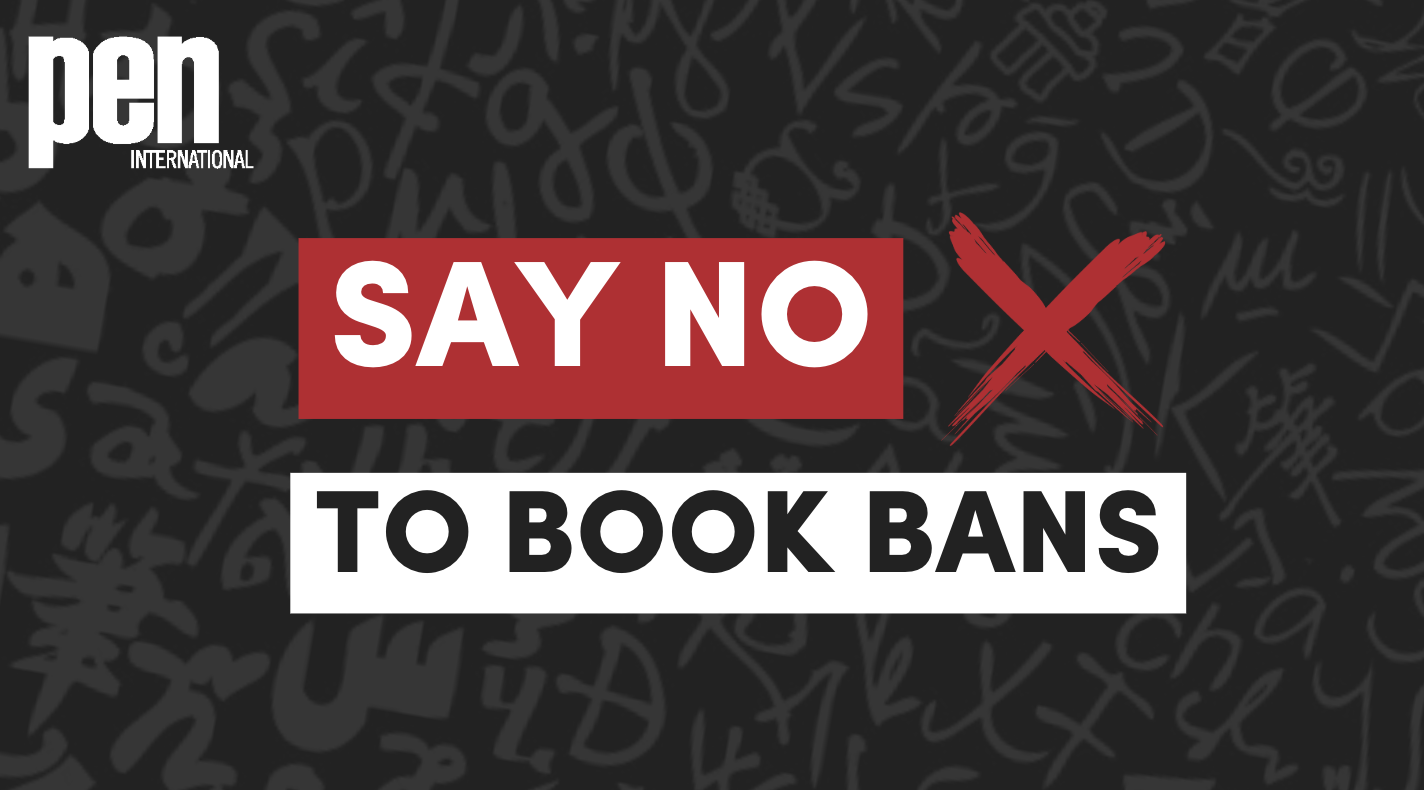PEN International calls for an end to book bans on World Book Day 2025
“Censoring books is not just silencing authors, it is an attempt to suppress society’s ability to question, and to reflect. Authoritarian governments fear the transformative power of words—words that challenge injustice, expose truths, and inspire change. At PEN International, we continue defending the right to write, to read, publish and imagine alternative futures. We believe that books are not only vessels of creativity, but also powerful forces capable of reshaping dominant narratives and resisting oppression.” Burhan Sonmez, President of PEN International
23 April 2025: Over the last year, PEN International has documented a dramatic increase in book banks and censorship, and the persecution of their authors globally, as documented in Identity On Trial: Persecution And Resistance, PEN International Case List 2025. Authorities worldwide are restricting access to books that address sexual violence, LGBTQ narratives, and issues of race, disproportionately affecting marginalised communities and signalling a dangerous shift towards intolerance.
The growing ban and censorship of books reflects ongoing attempts to reshape cultural and social narratives, highlighting the spread of cancel culture across regions and reaffirming how books remain powerful tools for social change. Such actions risk stigmatising authors and exposing them to potential threats and persecution.
In Afghanistan, the Taliban has continued to perpetuate an environment of fear and isolation amongst writers and poets who have authored books containing themes or ideas that run contrary to the Taliban’s interpretation of Sharia. In October 2024, The Taliban’s Ministry of Information and Culture published a list of over 400 banned books that have been seized from markets, libraries and book sellers on the basis of their apparent ‘conflict with Islamic and Afghan values’.
In Argentina, in 2024, government officials and groups linked to President Javier Milei’s supporters launched a campaign to censor books addressing issues such as feminicide and sexual abuse, calling for their removal from schools and bookshops. All targeted books were written by women; including Dolores Reyes’s Cometierra and María Sol Fantin’s If you weren't such a child: Memories of violence, among others.
In Equatorial Guinea, writer Trifonia Melibea Obono Ntutumu has faced ongoing intimidation and harassment by authorities since the 20216 publication of her novel La Bastarda, which explores women’s rights, gender and sexuality. The book remains banned.
In Malaysia, government authorities have banned at least nine books in early 2025 for being ‘undesirable publications’ that include content considered to be ‘prejudicial to morality’. Several of the prohibited books reportedly contain LGBTQ themes.
In Mali, non-fiction author Étienne Fakaba Sissoko was arrested in March 2024 over his book Propagande, Agitation, Harcèlement, which criticises the military government’s communication during the political transition.
In Palestine, the February arrest of Palestinian author Mahmoud Muna and his nephew Ahmad Muna, owners of Jerusalem’s Educational Bookshop, highlights the increasing silencing of voices speaking out against Israel’s occupation of the Palestinian territory.
In the Russian Federation, publishers recalled books with LGBTQ+ content, while in Belarus, books that challenged official narratives continued to be removed from bookshops and libraries, and to be labelled ‘extremist materials’.
In Türkiye, authorities maintained strict control over the media and publishing landscape. In July 2024, storytelling platform Wattpad was the latest victim of a series of court orders blocking popular social media platforms, websites, and literary publishers. In September, police raided a bookstore in Diyarbakır, detaining individuals and seizing hundreds of books on alleged terror-related charges. Scores of Kurdish writers, including novelist Yavuz Ekinci, who faced up to seven-and-a-half years in prison for his book Rüyası Bölünenler (Dream Divided), continued to be persecuted for promoting Kurdish language and culture.
In the United States, around 16,000 book bans have been recorded in public schools since 2021 – a level of censorship not seen since the McCarthy era, according to PEN America. Most targeted books address race, racism, LGBTQ+ issues, sexual violence, or make sexual references. Among these books banned in the 2023-2024 school year are Jodi Picoult’s Nineteen Minutes, John Green’s Looking for Alaska, Margaret Atwood’s The Handmaid’s Tale, and Khaled Hosseini’s The Kite Runner.
PEN International and its Centres urge authorities worldwide to:
End book bans and uphold freedom of expression.
Stop the persecution of authors, publishers, translators and educators for simply doing their work.
Support the autonomy of libraries, publishers, schools, and universities to curate collections and promote books in line with their values and the principles of freedom of expression, free from political interference.
Note to editors:
For more information, please contact Alicia Quiñones, Head of the Americas Region, at PEN International, email: [email protected]
For media queries please contact Sabrina Tucci, PEN International Communications and Campaigns Manager, [email protected]
About World Book and Copyright Day
In 1995, UNESCO established 23 April as World Book and Copyright Day to honor the memory of renowned authors William Shakespeare, Miguel de Cervantes, and Inca Garcilaso de la Vega, who all died on this date. The day serves as a global tribute to books and authors, promoting universal access to literature. UNESCO recognises books as the most powerful tools for sharing and preserving knowledge. Promoting the dissemination of books contributes to enlightening individuals, fostering a deeper collective awareness of global cultural traditions, and encouraging values of understanding, tolerance, and dialogue.

